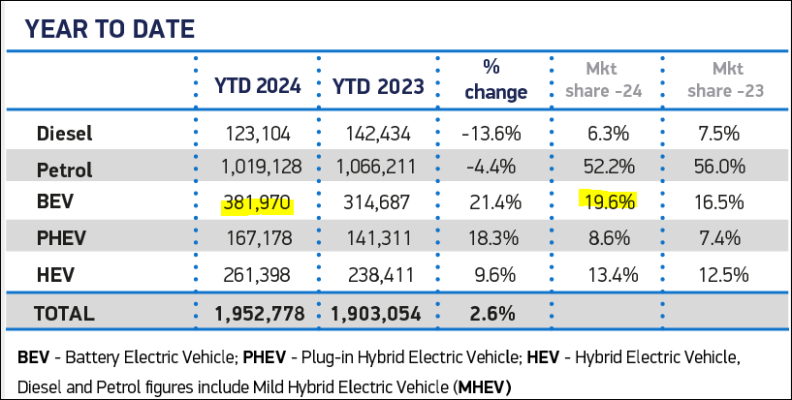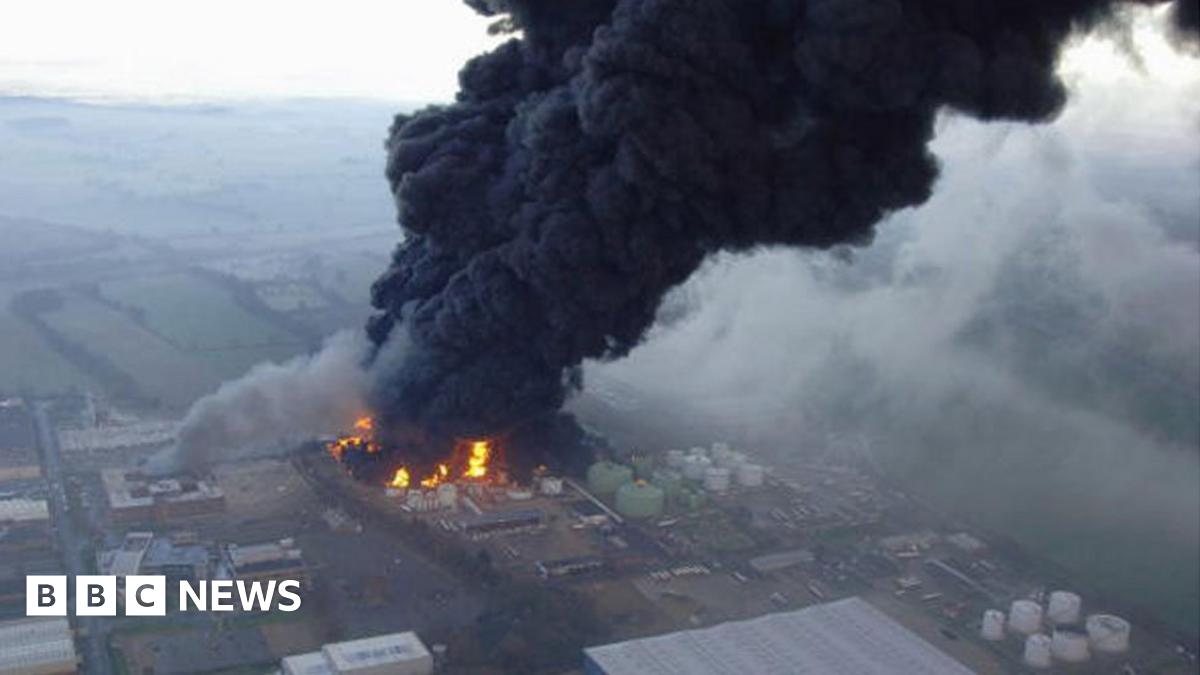I’ve certainly mentioned it - are you disputing that reluctance to change does not exist?Will has a history of posts using reluctance to change as a theme just like you. He also has a single post stating reluctance to change is irrational which should give you a clear indication of his train of thought on the subject.
Navigation
Install the app
How to install the app on iOS
Follow along with the video below to see how to install our site as a web app on your home screen.
Note: This feature may not be available in some browsers.
More options
You are using an out of date browser. It may not display this or other websites correctly.
You should upgrade or use an alternative browser.
You should upgrade or use an alternative browser.
The EV fact thread
- Thread starter Petrol Pete
- Start date
ChipChop
MB Enthusiast
The Society of Motor Manufacturers and Traders (SMMT) worked the figure out not me.One in ten? How do you work that out? There's only 1.25 million EV's on the road surely, out of over 30 million vehicles.
If every car changed hands in 2025, it would only be one in 25.
Or are you one of those folk who has always only bought new cars to run them until they die?
Or are you talking about the 400,000 EV's sold in 2024 (20% of the new market) ? Many of which will be resold, at big discounts, within a few months out into the direct consumer market as "pre-registered" or "management" cars.
- Joined
- Sep 27, 2016
- Messages
- 13,450
- Location
- UK
- Car
- Tesla Model S Performance, Model 3 LR, Model X /// Previous: 911, XFR, E320 CDI, C32 AMG, CLK 320
That was caused by a faulty air suspension compressor… the same type of compressor used in many cars.No Teslas are still catching fire at random it seems. Sad fact. Call it a public service anouncement for the Tesla owners on this Mercedes forum. One positive the Scottish fire brigade acted swiftly and prevented the fire spreading to the battery pack.
LOL this news report literally just popped up 

 www.express.co.uk
www.express.co.uk
Fire chiefs say the public must be told about the huge fire risks posed by electric vehicles, as the Government presses ahead with a ban on new petrol and diesel cars.
Damaged vehicles could burst into "explosive" flames and fires could resume days after they appeared to have been extinguished according to the National Fire Chiefs Council, the professional voice of the UK fire and rescue service.
Blazes could also release toxic fumes and even the water used to put out electric vehicle fires could become poisonous and pollute the environment.
In a dramatic statement to MPs, the NFCC called for warnings to be installed at electric vehicle charging points across the country.
It said: "Increasing awareness that electric vehicles are powered by lithium-ion batteries which can cause severe and potentially explosive fires when they become faulty, damaged (mechanically or electrically) or are exposed to extreme heat is paramount.
"Thermal runaway can lead to the creation of toxic vapours and gases such as (not exhaustive) carbon monoxide, hydrogen fluoride and hydrogen chloride.
"Electric vehicle fires present new challenges for FRSs (fire and rescue services) as suppressing an electric vehicle fire requires large amounts of water and the fire can reignite hours or sometimes days later.
"Fire water that is contaminated with chemicals from battery fires is dangerous to the environment."
Insisting it is vital to ensure safety information is presented to the public, the NFCC said: "More clear public information regarding electric vehicle chargepoint fault reporting is needed. Electric vehicle chargepoints can also provide information about the warning signs of an electric vehicle fire and what to do if an electric vehicle fire is suspected or happening."
The comments were made in a written submission to MPs looking at progress installing electric vehicle charging points in preparation to the switch to electric vehicles.

Electric cars can 'explode' and public must be warned say fire chiefs
An electric car can burst into flames again days after a fire appears to be put out
- Joined
- Jan 21, 2005
- Messages
- 31,476
- Location
- Mittel England
- Car
- Smart ForFour AMG Black Series Night Edition Premium Plus 125 Powered by Brabus
“Irrational” really shouldn’t be interpreted as an inflammatory or derogatory term in the context of change management. It’s a thing. It’s when the reaction to a change goes far beyond what would usually be expected based upon potential risk of actual impact. Often the change is relatively benign but results in a very strong reaction.Will has a history of posts using reluctance to change as a theme just like you. He also has a single post stating reluctance to change is irrational which should give you a clear indication of his train of thought on the subject.
There are all sorts of potential reasons for it, but one of them is when the change cuts across deeply held beliefs, and so evokes an emotional response. The strong reaction is sometimes thought to be because the change is perceived to call into question or diminish those deeply held beliefs, and not a result the impact of the change itself.
MikeInWimbledon
Hardcore MB Enthusiast
- Joined
- Nov 8, 2014
- Messages
- 14,731
- Car
- SL350 (Ex S211 E500,W212 E500, C216, S212E500, W211E500 5.5, W221S500, S211 E500, SL500, S500, E55)
ChipChop
MB Enthusiast
I’ve certainly mentioned it - are you disputing that reluctance to change does not exist?
Ever considered it is the product that is wrong not the consumer? The reluctance to change argument boils down to that. Adding irrational into the mix just makes it all the more obvious. Imho.
Or are you talking about the 400,000 EV's sold in 2024 (20% of the new market) ?
382,000 and 19.6% market share?


UK New Car Registration Data - Latest Figures & Statistics | SMMT
Discover the latest UK car registration data: new car registration statistics, the number of cars in the UK, and more.
Rather less for electric vans, whose market share actually went down compared to 2023 ...


Light Commercial Vehicle (LCV) Registrations Data - SMMT
Discover the latest UK light commercial vehicle data, LCV registrations with SMMT. Stay updated on light commercial vehicle sales trends.
- Joined
- Jan 21, 2005
- Messages
- 31,476
- Location
- Mittel England
- Car
- Smart ForFour AMG Black Series Night Edition Premium Plus 125 Powered by Brabus
Have you never recognised in yourself or others even a mild or moderate reluctance to change?Will has a history of posts using reluctance to change as a theme just like you. He also has a single post stating reluctance to change is irrational which should give you a clear indication of his train of thought on the subject.
I have. I would like to switch to MacOS but haven’t and probably won’t bring myself to do it unless I decided enough is enough and do it.
I resisted buying a smartphone believing that it was unnecessary, the battery life was inferior, and my Nokia did everything I needed & wanted.
We moved house and didn't change our GP for a couple of years concerned that the service would be poorer at the new surgery.
My Dad is absolutely adamant that he doesn’t want a water meter because it will cost him more. In a household of two with a small garden it’s unlikely.
In all cases my resistance to change was a little irrational. Both the potential and actual impact of those changes were much smaller than I believed.
- Joined
- Jan 21, 2005
- Messages
- 31,476
- Location
- Mittel England
- Car
- Smart ForFour AMG Black Series Night Edition Premium Plus 125 Powered by Brabus
Definitely possible. Which for you are the classic and most clear examples of this?Ever considered it is the product that is wrong not the consumer? The reluctance to change argument boils down to that. Adding irrational into the mix just makes it all the more obvious. Imho.
But reluctance to change is not unique to EVs, is it?Ever considered it is the product that is wrong not the consumer? The reluctance to change argument boils down to that. Adding irrational into the mix just makes it all the more obvious. Imho.
Many people are reluctant to change in general - as exampled above by Bobby Dazzler. This is one of the reasons why some changes take time. People mentally need time to adjust and change their perceptions.
In my experience, people who are more reluctant to change in general would therefore be more reluctant to change their motoring habits too.
I’m not a psychologist but I have experienced this first hand with people over the years - have you not come across this before?
- Joined
- Jun 24, 2008
- Messages
- 51,330
- Location
- London
- Car
- 2025 Hyundai IONIQ 5 N-Line S RWD / 2016 Suzuki Vitara 1.6L Petrol AWD
...We won't know for a few years yet whether older EVs might see a higher incidence of fires (as battery packs age etc.).
No we don't...
Interesting and entertaining video on the recent Moss Landing grid storage battery fire in the US. Try and keep an open mind and stick with it - he is in favour of these installations, but highly critical of some of the design/management here (including the specific type of cells chosen):
- Joined
- Jun 24, 2008
- Messages
- 51,330
- Location
- London
- Car
- 2025 Hyundai IONIQ 5 N-Line S RWD / 2016 Suzuki Vitara 1.6L Petrol AWD
One in ten? How do you work that out? There's only 1.25 million EV's on the road surely, out of over 30 million vehicles.
If every car changed hands in 2025, it would only be one in 25.
Or are you one of those folk who has always only bought new cars to run them until they die?
Or are you talking about the 400,000 EV's sold in 2024 (20% of the new market) ? Many of which will be resold, at big discounts, within a few months out into the direct consumer market as "pre-registered" or "management" cars. (£25k gets you a £35k VW ID3 with only 3k on the clock)
I think that the 'one in ten" was in reference to private consumer purchases of new cars, I.e. as opposed to business leases whoch probably make the majority of new EV sales. Either that, or he may have been referring to UB40
ChipChop
MB Enthusiast
But but but an ICE car can burst into flames again days after the fire appears to be put out. Right?LOL this news report literally just popped up

Electric cars can 'explode' and public must be warned say fire chiefs
An electric car can burst into flames again days after a fire appears to be put outwww.express.co.uk

ChipChop
MB Enthusiast
Either way private buyers are not buying new EV's.I think that the 'one in ten" was in reference to private consumer purchases of new cars, I.e. as opposed to business leases whoch probably make the majority of new EV sales. Either that, or he may have been referring to UB40
But but but an ICE car can burst into flames again days after the fire appears to be put out. Right?

Buncefield explosion: 'I thought a plane landed on us'
Ten years after the Buncefield explosion, what was the lasting impact?
www.bbc.co.uk
Any better?
ChipChop
MB Enthusiast
Then practioners of change management are using the incorrect word. The word "irrational" already has meaning.“Irrational” really shouldn’t be interpreted as an inflammatory or derogatory term in the context of change management. It’s a thing. It’s when the reaction to a change goes far beyond what would usually be expected based upon potential risk of actual impact. Often the change is relatively benign but results in a very strong reaction.
There are all sorts of potential reasons for it, but one of them is when the change cuts across deeply held beliefs, and so evokes an emotional response. The strong reaction is sometimes thought to be because the change is perceived to call into question or diminish those deeply held beliefs, and not a result the impact of the change itself.
- Joined
- Jan 21, 2005
- Messages
- 31,476
- Location
- Mittel England
- Car
- Smart ForFour AMG Black Series Night Edition Premium Plus 125 Powered by Brabus
Blimey, that’s pretty good that can’t be far off the 2024 target. Considering the effect of pushing back from 20230 to 2035x then that seems surprisingly good to me.382,000 and 19.6% market share?
ChipChop
MB Enthusiast
No not really. If the latest and greatest thing is demonstrably better than the thing it seeks to replace people will switch.Have you never recognised in yourself or others even a mild or moderate reluctance to change?
I have. I would like to switch to MacOS but haven’t and probably won’t bring myself to do it unless I decided enough is enough and do it.
I resisted buying a smartphone believing that it was unnecessary, the battery life was inferior, and my Nokia did everything I needed & wanted.
We moved house and didn't change our GP for a couple of years concerned that the service would be poorer at the new surgery.
My Dad is absolutely adamant that he doesn’t want a water meter because it will cost him more. In a household of two with a small garden it’s unlikely.
In all cases my resistance to change was a little irrational. Both the potential and actual impact of those changes were much smaller than I believed.
Flogging a dead horse however is more difficult.
Users who are viewing this thread
Total: 2 (members: 0, guests: 2)
Similar threads
- Replies
- 24
- Views
- 736
- Replies
- 26
- Views
- 4K
- Replies
- 263
- Views
- 19K

